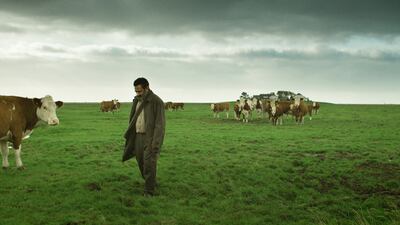A taciturn Arab writer heads to a remote area in the north of Germany, contemplating suicide. It might not sound very cheery, but that’s one way of summarising Yunan, which was unveiled at this year’s Berlin Film Festival. It’s the only Arab-led film in main competition, although we never get to learn where Munir (Lebanese actor Georges Khabbaz) comes from. It was a deliberate move by the film’s young writer-director Ameer Fakher Eldin. “I wanted to focus on his psychological journey to make it even more universal,” he tells The National.
Nevertheless, there’s no doubt that this story about displacement is a deeply personal one. “It’s very much my reality,” the filmmaker explains. He was raised in the Golan Heights, once a Syrian region, which has been under Israeli occupation for more than 50 years. “My parents are Syrian, but we cannot go to Syria.” To complicate matters, he was born in 1991 in Kyiv, Ukraine, where his parents were studying medicine. “We didn’t stay long, because after the fall of the Soviet Union, it was very hard to live there. So they came back to the Golan Heights.”
Like so many, his idea of home has become very skewed, maybe even a romantic illusion. “I have nothing to remember from Syria as a homeland, but it is my homeland. But what do I fantasise about? I kind of fantasise about a magical homeland that I never even knew.”

Displacement is not only geographical, but emotional, which may account for the film’s parable-like feel. In the film, Munir’s mother has Alzheimer’s and is beginning to forget her son. “The figure of the mother could be for me, in a sense, Syria,” the director adds. “Syria forgot about me.”
A co-production, with financing from Palestine, Qatar, Jordan and Saudi Arabia, among others, Yunan is easily the most dramatic-looking film of this year’s Berlinale selection. Much of this has to do with its stunning locale, Langeness, in Schleswig-Holstein. This is not an island, we learn, but a “hallig”, land that can become flooded. “Even Germans don’t know about this place,” says Fakher Eldin, who says it’s like going “to the edge of the world”. With its marginalised, conservative locals, it’s the perfect backdrop for a story about “the importance of how we should stop looking at others as threats”.
At its heart are two terrific performances, from Khabbaz and Hanna Schygulla, who plays Valeska, who owns a small boarding house and shows Munir kindness when he arrives without a room in Langeness. “Georges is an incredible actor,” says the director. “He’s a great artist and a super sensitive soul and very intelligent. He usually does more comedy, black comedy and he’s great at that. And I was thinking, ‘Okay, I’m really looking for a character that has sad eyes'.

"And he always wears these glasses. In one interview I saw with him without them. I said, ‘Wow.’ It was like he’s hiding. So I said, ‘You're gonna be without these glasses for the film'.”
Schygulla, now 81 years-old, is the beloved German actress famed for her collaborations with director Rainer Werner Fassbinder (she won Best Actress in Berlin for 1979’s The Marriage of Maria Braun). Fakher Eldin sent a hand-written note to her home in Paris. She agreed to meet and they spent time in a cafe in Paris, when he had a moment of dizziness. Fakher Eldin had been suffering from breathing problems, despite receiving a clean bill of health from his doctor. Was it stress? Or depression? A panic attack? Whatever the truth, he began to feel a shortness of breath in front of Schygulla.
“She noticed and she put her hand on my hand, and she told me, ‘Maybe you don’t need that much air'. I said, ‘Wow.’ I mean, I don’t know the woman. I mean, she’s a legend, of course, and she allows herself to be kind and to be motherly. She cared for my soul, without the need to know me so much, because she believes in that. I thought this is perfect for the role.”

It also plays out like this in the film, as Valeska calms Munir, with Schygulla delivering a warm, touching performance.
Yunan is also the second part of a trilogy. The first, Fakher Eldin’s feature debut, 2021’s The Stranger, dealt with an unlicensed doctor in Golan Heights who encounters a wounded solider from the war in Syria. If that was a film “about a man who feels a stranger among his own people”, Yunan is more about a “stranger amongst other strangers," he adds. “My characters are victims. I’m treating them also as victims of national crisis or wars.”
But victim is such a negative term. His planned third part will be different, he promises. “I want to actually stop looking as them as victims.”

